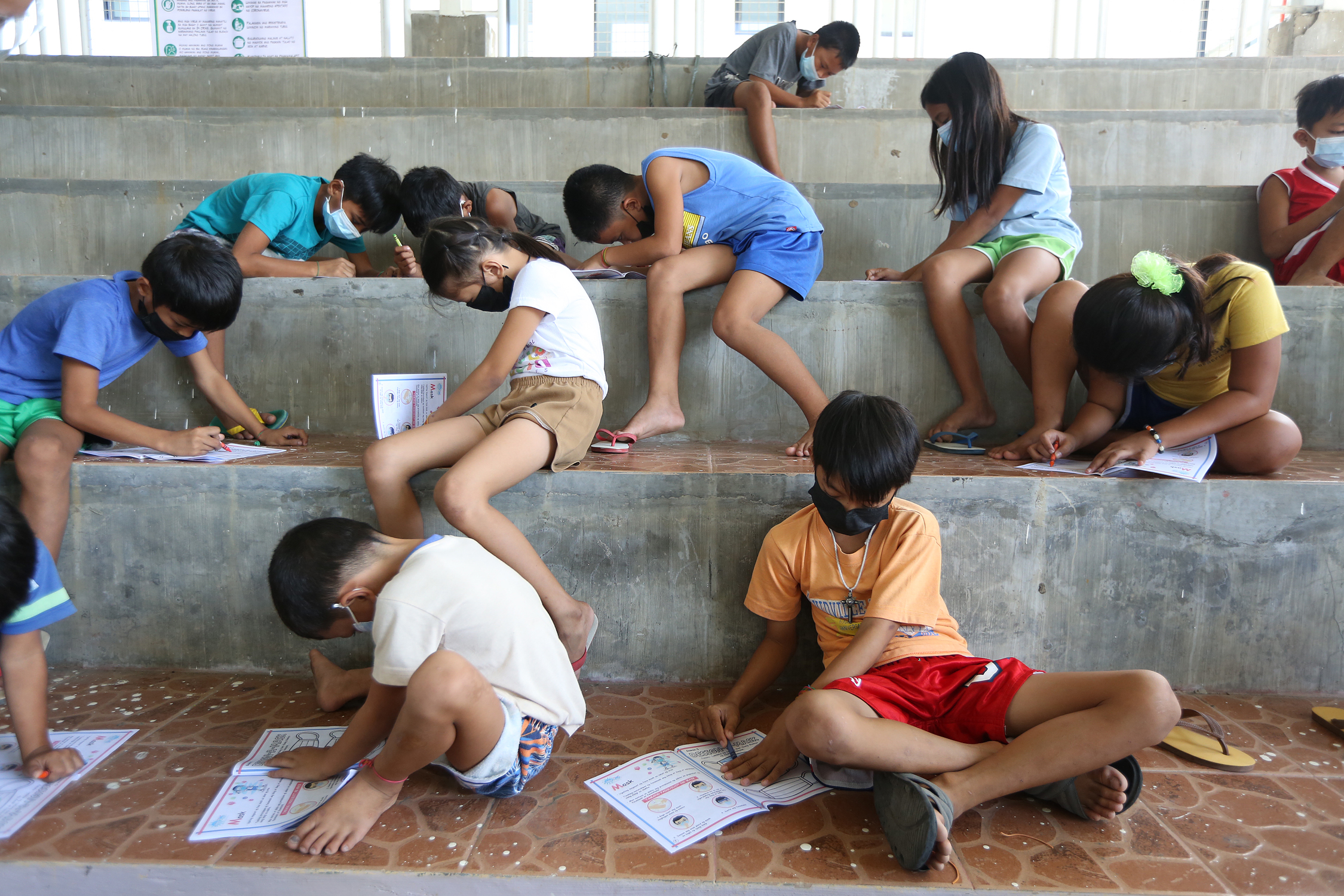Unicef: Focus on children’s plight as Taal Volcano rumbles

NO ORDINARY PLAYTIME Children temporarily staying at Plaza Elena evacuation center at Barangay Poblacion in Agoncillo, Batangas, are busy coloring COVID-19 flyers distributed by government social workers during an activity especially prepared for young members of families who fled their communities due to Taal Volcano’s unrest. —NIÑO JESUS ORBETA
Taal Volcano erupted five times on Wednesday morning, nearly a week after a short phreatomagmatic eruption triggered a heightened alert for the volcano and forced residents in high-risk villages in Batangas province to evacuate for their safety.
With Taal’s continuing unrest, the United Nations Children’s Fund (Unicef) has expressed concern for children in affected communities, saying those living within danger zones and in evacuation centers are at risk of respiratory problems, waterborne and vaccine-preventable diseases as well as malnutrition due to food insecurity.
Four minutes before noon Wednesday, Taal’s main crater displayed a phreatomagmatic burst, producing a 200-meter dark gray plume, which was captured by a camera placed by the Philippine Institute of Volcanology and Seismology (Phivolcs).
The eruption lasted for only a minute, volcanologists said.
A phreatomagmatic eruption occurs when new magma interacts with water. In Taal’s case, the rising magma came in contact with the water in the main crater lake.
Article continues after this advertisementThe first eruption on Wednesday occurred at 5:18 a.m., which also lasted for a minute. It was followed by a similar short phreatomagmatic burst at 8:47 a.m., which lasted for seven minutes, and two more similar eruptions at 9:15 a.m. and 9:26 a.m. that lasted for two and five minutes, respectively.
Article continues after this advertisementPhivolcs had earlier warned that Taal may erupt similarly to the July 1 event, following an “anomalously high” volcanic sulfur dioxide (SO2) gas emission over the weekend.
Vulnerable
Alert level 3, which signifies magmatic unrest, remains over Taal, the country’s second most active volcano. On Tuesday, SO2 emissions in Taal averaged 7,560 tons per day. The Taal Volcano Network also recorded 55 volcanic earthquakes between Tuesday and Wednesday.
Unicef said displacement would make children and their families more vulnerable to the new coronavirus disease (COVID-19) due to possible challenges faced in evacuation centers, including crowding, limited hygiene facilities, and limited supplies of personal protective equipment, it said.
It added that children may also exhibit stress and need to be supported with psychosocial interventions.
“During emergencies, children are especially vulnerable to disease, malnutrition, and violence. Unicef focuses on these children and their families, to save lives and support early action required to protect and safeguard their well-being. Unicef remains ready to support the government of the Philippines,” said Oyunsaikhan Dendevnorov, Unicef Philippines representative.
Unicef said it had prepositioned emergency supplies to respond to needs for safe drinking water, sanitation, hygiene, nutrition, education, child protection, and COVID-19 prevention. Displaced
The Department of Social Welfare and Development (DSWD) said that as of July 6, at least 1,535 families (5,786 people) were displaced by Taal’s unrest in Batangas.
According to a DSWD report, 797 families, or 3,027 people, are staying in 20 evacuation centers in the towns of Agoncillo, Balete, Laurel, and Nasugbu.
Some 738 families (2,759 people) are temporarily staying with their relatives and friends in Calabarzon (Cavite, Laguna, Batangas, Rizal, Quezon) region, it added.
Dr. Paula Paz Sydiongco, the officer in charge of the Department of Health in the region, said five Mental Health and Psychosocial Support (MHPSS) teams would visit evacuation centers in the towns of Alitagtag, Balayan, Balete, Laurel, Agoncillo, San Nicolas, Talisay, and San Jose and Tanauan City to provide evacuees with psychosocial support.
The MHPSS teams are composed of doctors, psychologists, health officers and nurses. —WITH A REPORT FROM DELFIN T. MALLARI JR. INQ